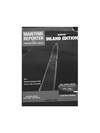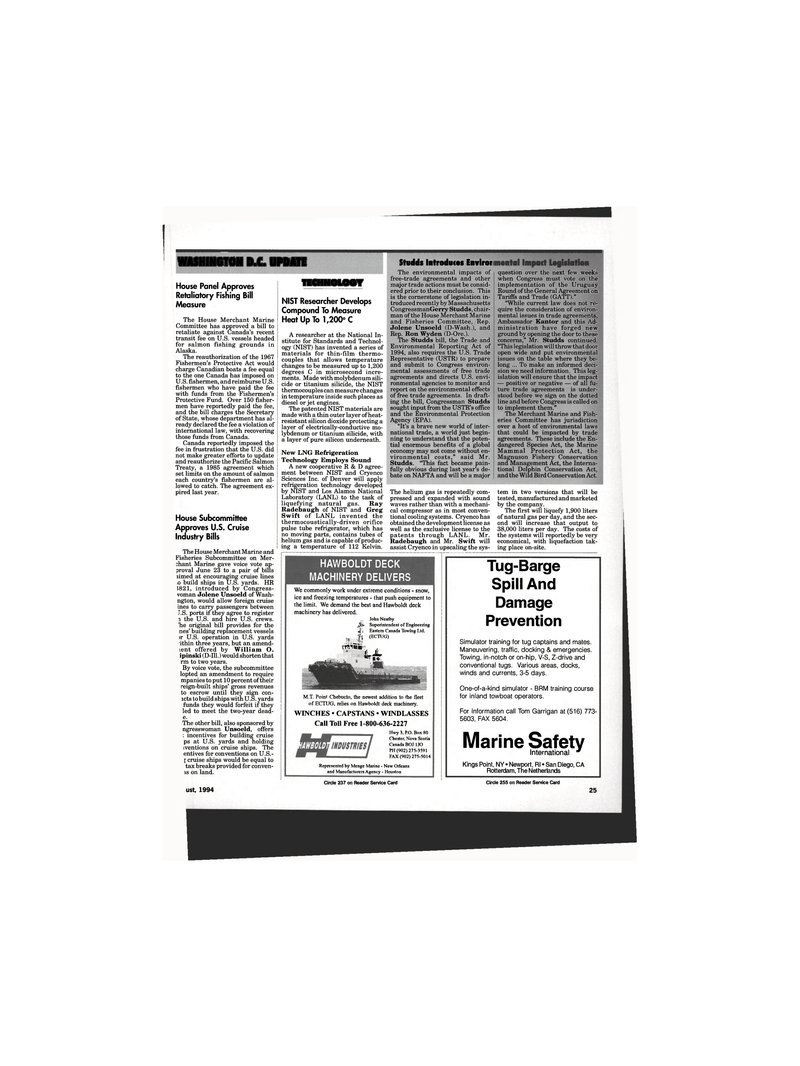
Page 45: of Maritime Reporter Magazine (August 1994)
Read this page in Pdf, Flash or Html5 edition of August 1994 Maritime Reporter Magazine
WASHINGTON D.C. UPDATE Studds Introduces inviroi
The environmental impacts of free-trade agreements and other major trade actions must be consid- ered prior to their conclusion. This is the cornerstone of legislation in- troduced recently by Massachusetts
CongressmanGerry Studds, chair- man of the House Merchant Marine and Fisheries Committee, Rep.
Jolene Unsoeld (D-Wash.), and
Rep. Ron Wyden (D-Ore.).
The Studds bill, the Trade and
Environmental Reporting Act of 1994, also requires the U.S. Trade
Representative (USTR) to prepare and submit to Congress environ- mental assessments of free trade agreements and directs U.S. envi- ronmental agencies to monitor and report on the environmental effects of free trade agreements. In draft- ing the bill, Congressman Studds sought input from the USTR's office and the Environmental Protection
Agency (EPA). "It's a brave new world of inter- national trade, a world just begin- ning to understand that the poten- tial enormous benefits of a global economy may not come without en- vironmental costs," said Mr.
Studds. "This fact became pain- fully obvious during last year's de- bate on NAFTA and will be a major question over the next few weeks when Congress must vote on the implementation of the Uruguay
Round of the General Agreement on
Tariffs and Trade (GATT)." "While current law does not re- quire the consideration of environ- mental issues in trade agreements,
Ambassador Kantor and this Ad- ministration have forged new ground by opening the door to these concerns," Mr. Studds continued. "This legislation will throw that door open wide and put environmental issues on the table where they be- long ... To make an informed deci- sion we need information. This leg- islation will ensure that the impact — positive or negative — of all fu- ture trade agreements is under- stood before we sign on the dotted line and before Congress is called on to implement them."
The Merchant Marine and Fish- eries Committee has jurisdiction over a host of environmental laws that could be impacted by trade agreements. These include the En- dangered Species Act, the Marine
Mammal Protection Act, the
Magnuson Fishery Conservation and Management Act, the Interna- tional Dolphin Conservation Act, and the Wild Bird Conservation Act.
House Panel Approves
Retaliatory Fishing Bill
Measure
The House Merchant Marine
Committee has approved a bill to retaliate against Canada's recent transit fee on U.S. vessels headed for salmon fishing grounds in [
Alaska.
The reauthorization of the 1967
Fishermen's Protective Act would | charge Canadian boats a fee equal [ to the one Canada has imposed on
U.S. fishermen, and reimburse U.S. ( fishermen who have paid the fee with funds from the Fishermen's
Protective Fund. Over 150 fisher- men have reportedly paid the fee, and the bill charges the Secretary of State, whose department has al- ready declared the fee a violation of international law, with recovering those funds from Canada.
Canada reportedly imposed the fee in frustration that the U.S. did not make greater efforts to update ; and reauthorize the Pacific Salmon
Treaty, a 1985 agreement which set limits on the amount of salmon each country's fishermen are al- ' lowed to catch. The agreement ex- pired last year. j
House Subcommittee
Approves U.S. Cruise
Industry Bills i
The House Merchant Marine and
Fisheries Subcommittee on Mer- chant Marine gave voice vote ap- proval June 23 to a pair of bills limed at encouraging cruise lines ,o build ships in U.S. yards. HR 5821, introduced by Congress- voman Jolene Unsoeld of Wash- ngton, would allow foreign cruise ines to carry passengers between
J.S. ports if they agree to register a the U.S. and hire U.S. crews, 'he original bill provides for the nes' building replacement vessels >r U.S. operation in U.S. yards ithin three years, but an amend- ient offered by William O. ipinski (D-Ill.) would shorten that rm to two years.
By voice vote, the subcommittee lopted an amendment to require mpanies to put 10 percent of their reign-built ships' gross revenues to escrow until they sign con- icts to build ships with U.S. yards funds they would forfeit if they led to meet the two-year dead- e.
The other bill, also sponsored by ngresswoman Unsoeld, offers : incentives for building cruise ps at U.S. yards and holding
Lventions on cruise ships. The entives for conventions on U.S.- l cruise ships would be equal to tax breaks provided for conven- ts on land.
TECHNOLOGY
NIST Researcher Develops
Compound To Measure
Heat Up To 1,200° C
A researcher at the National In- stitute for Standards and Technol- ogy (NIST) has invented a series of materials for thin-film thermo- couples that allows temperature changes to be measured up to 1,200 degrees C in microsecond incre- ments. Made with molybdenum sili- cide or titanium silicide, the NIST thermocouples can measure changes in temperature inside such places as diesel or jet engines.
The patented NIST materials are made with a thin outer layer of heat- resistant silicon dioxide protecting a layer of electrically-conductive mo- lybdenum or titanium silicide, with a layer of pure silicon underneath.
New LNG Refrigeration
Technology Employs Sound
A new cooperative R&D agree- ment between NIST and Cryenco
Sciences Inc. of Denver will apply refrigeration technology developed by NIST and Los Alamos National
Laboratory (LANL) to the task of liquefying natural gas. Ray
Radebaugh of NIST and Greg
Swift of LANL invented the thermocoustically-driven orifice pulse tube refrigerator, which has no moving parts, contains tubes of helium gas and is capable of produc- ing a temperature of 112 Kelvin.
The helium gas is repeatedly com- pressed and expanded with sound waves rather than with a mechani- cal compressor as in most conven- tional cooling systems. Cryenco has obtained the development license as well as the exclusive license to the patents through LANL. Mr.
Radebaugh and Mr. Swift will assist Cryenco in upscaling the sys- tem in two versions that will be tested, manufactured and marketed by the company.
The first will liquefy 1,900 liters of natural gas per day, and the sec- ond will increase that output to 38,000 liters per day. The costs of the systems will reportedly be very economical, with liquefaction tak- ing place on-site.
HAWB0LDT DECK
MACHINERY DELIVERS
We commonly work under extreme conditions - snow, ice and freezing temperatures - that push equipment to the limit. We demand the best and Hawboldt deck machinery has delivered.
John Neatby jib- Superintendent of Engineering j.: Eastern Canada Towing Ltd. | (ECTUG) vfMiir \ JL •wrjPSr
M.T. Point Chebucto, the newest addition to the fleet of ECTUG, relies on Hawboldt deck machinery.
WINCHES • CAPSTANS • WINDLASSES
Call Toll Free 1-800-636-2227
Hwy 3. P.O. Box 80
Chester, Nova Scotia
Canada BOJ 1JO
PH (902) 275-3591
FAX (902)275-5014
Represented by Menge Marine - New Orleans and Manufacturers Agency - Houston
Tug-Barge
Spill And
Damage
Prevention
Simulator training for tug captains and mates.
Maneuvering, traffic, docking & emergencies.
Towing, in-notch or on-hip, V-S, Z-drive and conventional tugs. Various areas, docks, winds and currents, 3-5 days.
One-of-a-kind simulator - BRM training course for inland towboat operators.
For Information call Tom Garrigan at (516) 773- 5603, FAX 5604.
Marine Safety
International *
Kings Point, NY • Newport, Rl • San Diego, CA
Rotterdam, The Netherlands
August, 1994
Circle 237 on Reader Service Card Circle 255 on Reader Service Card 25

 44
44

 46
46
